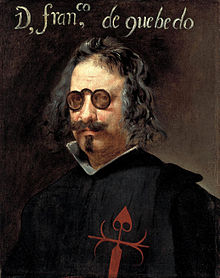Francisco de Quevedo
| Francisco de Quevedo | |
|---|---|

Francisco de Quevedo, Juan van der Hamen? after a painting by Diego Velázquez
|
|
| Born | Francisco Gómez de Quevedo y Santibáñez Villegas 14 September 1580 Madrid, Spain |
| Died | 8 September 1645 (aged 64) Villanueva de los Infantes, Spain |
| Occupation | Poet, politician |
| Language | Spanish |
| Nationality | Spanish |
| Period | Spanish Golden Age |
| Literary movement | Conceptismo |
Francisco Gómez de Quevedo y Santibáñez Villegas (Spanish pronunciation: [fɾanˈθisko ðe keˈβeðo]; 14 September 1580 – 8 September 1645) was a Spanish nobleman, politician and writer of the Baroque era. Along with his lifelong rival, Luis de Góngora, Quevedo was one of the most prominent Spanish poets of the age. His style is characterized by what was called conceptismo. This style existed in stark contrast to Góngora's culteranismo.
Quevedo was born in Madrid into a family of hidalgos from the village of Vejorís, located in the northern mountainous region of Cantabria. His family was descended from the Castilian nobility.
Quevedo's father, Francisco Gómez de Quevedo, was secretary to Maria of Spain, daughter of emperor Charles V and wife of Maximilian II, Holy Roman Emperor, and his mother, Madrid-born María de Santibáñez, was lady-in-waiting to the queen. Quevedo matured surrounded by dignitaries and nobility at the royal court. Intellectually gifted, Quevedo was physically handicapped with a club foot, and myopia. Since he always wore pince-nez, his name in the plural, quevedos, came to mean "pince-nez" in the Spanish language.
Orphaned by the age of six, he was able to attend the Imperial School run by the Jesuits in Madrid. He then attended university at Alcalá de Henares from 1596 to 1600. By his own account, he made independent studies in philosophy, classical languages, Arabic, Hebrew, French and Italian.
...
Wikipedia
